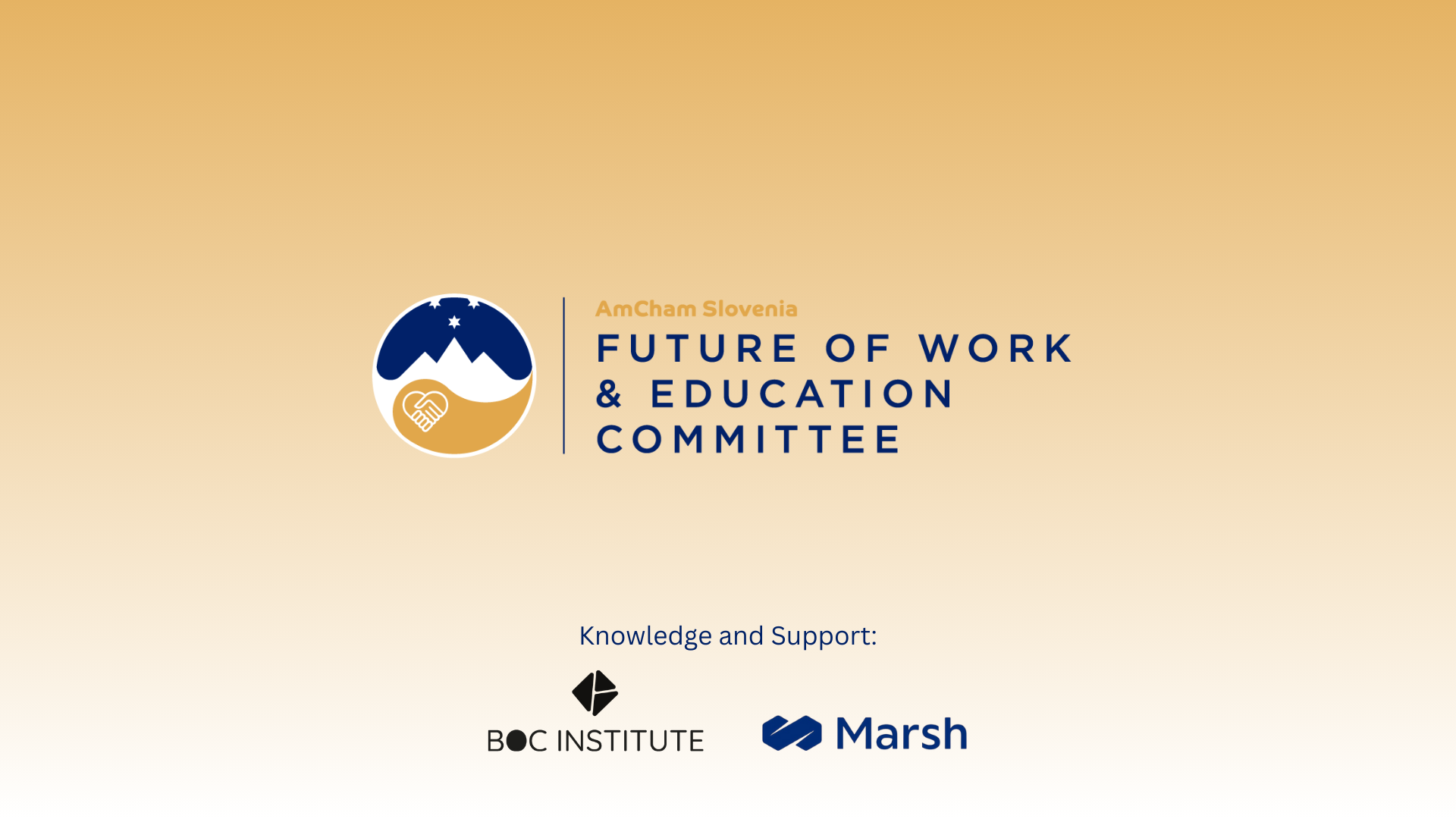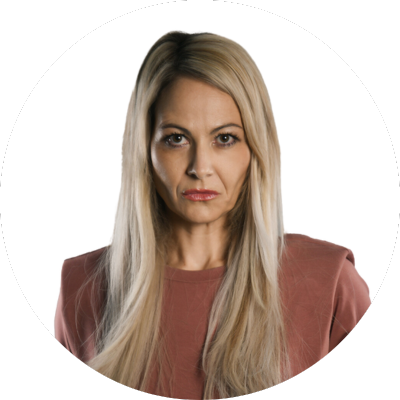The AmCham Future of Work and Education Committee is a supporter of efforts to make the labor market more flexible, create new forms of work, and preserve jobs in Slovenia. At the same time, we are working to introduce the competencies and skills of the future into the education system and the labor market, promote intergenerational cooperation, and attract and retain talent in Slovenia.

AmCham Future of Work and Education Committee
Key areas of the Committee’s work
Introducing New Forms of Work to the Labor Market
The labor market must become more flexible and enable various forms of work that follow technological development and new types of professions. Ensuring successful business processes will require collaboration between businesses and a wide range of experts, creating jobs that are characterized by flexibility, efficiency, and competitiveness, and using new models and approaches in line with the digital transformation. Businesses that are more flexible in hiring and devote more attention to employee satisfaction and workplace well-being have repeatedly proven to be more successful.
Remote work is becoming increasingly common, and experience suggests that this trend will continue in the future. Remote work is a modern way of organizing work made possible by digitalization and typically requires a high degree of motivation and self-discipline. It allows workers greater flexibility and the freedom to distribute their working hours and free time in a way that suits them. We call for legislative changes to the regulation of remote work since the current system is still too rigid for the needs of the present day and the perceptions of younger generations in the labor market. Legislation needs to be adapted in a way that enables flexibility for employers and workers, reduces administrative barriers, and appropriately simplifies processes to ensure occupational safety in the case of remote work. Current needs require, in practice, a high degree of adaptation of normative regulation in the shortest possible time.
The amendment to the Labor and Social Security Registers Act, which introduces a new definition of the obligation to keep records, runs counter to the flexibilization of the work process. We are aware that the proposed amendment aims to prevent the most severe forms of violations of workers’ rights, but we do not believe that it will prevent said violations since recorded working hours will not necessarily reflect actual working time and workers’ breaks.
Retaining Domestic Talents and Skills and Attracting Foreign Experts
Slovenia must create an environment that will allow talented individuals to develop and enhance their abilities and skills. Talent requires an environment that is aware of its contribution, appreciates and rewards it, and simultaneously provides new opportunities that lead to its growth and further development. Only in this way will high added-value jobs remain and continue to be created in Slovenia.
Following a strategy setting out what kind of future we want, we must develop a clear plan that will stimulate and reward domestic and foreign experts and attract highly qualified individuals from elsewhere. It is professions that employ highly qualified individuals and create higher added value that will contribute to societal progress and ensure a welfare society.
While the amendments to the Aliens Act and the Employment, Self-Employment and Work of Foreigners Act somewhat simplify the employment of foreign nationals, both require proof of “survival-level” proficiency in the Slovenian language as a condition for extending a temporary residence permit for family reunification. We warn that, faced with the condition of knowledge of the language as a condition for extension of a temporary residence permit for family reunification and for obtaining a permanent residence permit, foreign experts will likely opt for a job elsewhere.
Introducing Skills of the Future Into the Economy
We emphasize the need to invest in people at all levels of businesses and organizations since there will be no economic growth without developing the competencies and skills of the future, which will become indispensable in the labor market in the coming years and decades. Businesses need to adapt their work processes to make people’s work easier and encourage the development of the relevant, specific competencies dictated by the future of work. As people bring new ideas, inspire others, and are key to the success of organizations, it is essential that we invest in their development and strengthen their competencies.
Adapting Education Programs to the Competencies and Skills of the Future
Sustainable leadership is a new perspective and model in the management of organizations and people. It represents a vision that goes beyond immediate, short-term benefits with an awareness of the organization’s role in a broader context. Sustainable leadership chooses strategies to achieve results that meet the criteria of environmental, social, and financial performance. Organizations that have already internalized sustainable leadership have a competitive advantage since it brings opportunities in the form of innovations, constant improvements, and long-term success. Sustainable leadership is also promoted by the Corporate Sustainability Reporting Directive (CSRD), which supports the European Green Deal, a set of political initiatives focused on combating the climate crisis by transforming the EU into a modern, efficient, and competitive economy with net-zero greenhouse gas emissions by 2050.
Sustainable Leadership
We emphasize the need to invest in people at all levels of companies and organizations, because success will not happen without developing the competencies and skills of the future, which will be indispensable in the labor market in the years and decades to come. Companies need to adapt work processes to make people’s jobs easier and to encourage the development of relevant, specific competencies dictated by the future of work. Because it is people who bring new ideas, inspire others, and lead organizations to success, it is necessary to invest in them and develop their competencies.
Lifelong Learning
Individuals, businesses, and society must realize that continuous learning will be necessary. Businesses, organizations, and the state administration must include lifelong learning in their internal educational processes and corporate culture.
We welcome the initiative of the University of Ljubljana that, through the “UL for a Sustainable Society” (Ultra) project, introduces micro-credentials as proof of completing short courses that provide individuals with additional knowledge, skills and competencies and, in this way, promotes lifelong learning.
Intergenerational Cooperation
Sustainable leadership should be a niche and a model for managing organizations and people. It represents a vision beyond immediate, short-term gains, with awareness of the organization’s role in the wider context. Sustainable leadership selects strategies to achieve results that meet environmental, social, and financial performance criteria. Organizations that have embraced sustainable leadership have a competitive advantage because it brings opportunities in the form of innovation, continuous improvement, and long-term success.
AmCham Working Group Document – Champions 50+

Who are the members of the Committee?
See the full list of Committee members.
Join the AmCham Future of Work and Education Committee
For all questions related to the Committee’s work, you can turn to our Committee coordinator Mojka Mišič, MSc, our Communications and Advocacy Director.

Mojka Mišič, MSc
Communications and Advocacy Director

